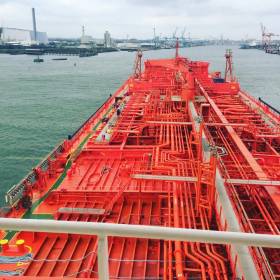Displaying items by tag: Deep Sea Shipping
Tanker Snapshot: Molasses from Guatemala Via Amsterdam Discharged in Dublin
#TankerSnap – The above photograph is not of the red-hulled tanker Iver Ability which anchored in Dublin Bay for more than five months and in doing so drew much mainstream media attention, writes Jehan Ashmore.
So what is the identity of this tanker?... with this view overlooking the vessel's complex looking cargo tanks pipeline network. The answer to the vessel's identity is that of the MS Simon, a 40,000dwt Liberian flagged oil-chemical bulk liquids tanker.
The vessel had berthed in Dublin Port nine days ago with a cargo of molasses from Guatemala in Central America. This followed a crossing of the Atlantic, where MS Simon made an en-route call to Amsterdam prior to docking in Dublin Port.
The 176m long vessel discharged the molasses at a northside fuel jetty before shifting to the south bank along Deepwater Quay.
At this same berth (No.47) is where previously Iver Ability made several calls during the prolonged anchorage that arose following a 'cargo reaction' incident in transporting bitumen in the port.
The final port call was prior to the festive season. On that occasion a change of certain personnel of the 129m vessel was undertaken.
Late last month Iver Ability finally departed Dublin Bay bound for the Netherlands.
On completion of duties that is of the MS Simon, the tanker departed the capital this week. On Thursday the ship was monitored offshore of the Scottish coast. At that stage the tanker was off Islay, the southernmost of the Inner Hebrideas.
IEA Export Industry Awards to Shipping
In the category of Short Sea Shipping Company of the Year, sponsored by the Irish Maritime Development Office, which recognises the strategically important role of short sea shipping to our economy, the winner of the award was CLDN Colbefret Group.
The Belgium operator opened two new routes from Dublin to Rotterdam and Zeebrugge in November last year, providing a range of transport options to Irish exporters selling to Europe. Since then Cobelfret have gradually introduced new Con-Ro (Containers and Roll-On/Roll-Off) vessels onto the continental routes. The six 25,000 gross tonnes newbuilds were built by FGS Flensburg, Germany and the latest unit Opaline, is due to make a Dublin debut tomorrow.
Cobelfret's operations in Dublin are based in Alexandra Basin East using the ports No. 2 ro-ro linkspan berth. A previous linkspan built in the 1950's was demolished last summer to develop a larger linkspan, to cater for larger tonnage like the Opaline. The new vessel has 2,907 lane metres for freight vehicles spread over three decks and a container capacity for 854 TEU mafi-trailers.
Donegal based Marine Harvest won the Seafood Export Award, sponsored by Bord Biá. The company is an indigenous fully-integrated salmon breeding, farming and processing operation, exporting premium products to Europe and North America.
The overall winner of the IEA's Export Industry Award for 2010 was the Irish Dairy Board.
























































